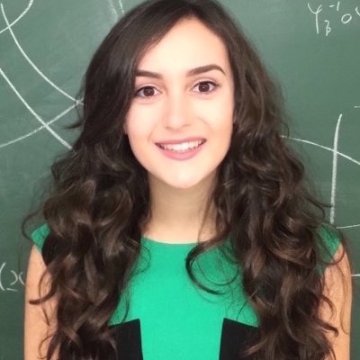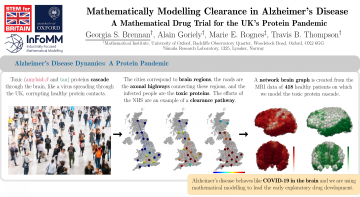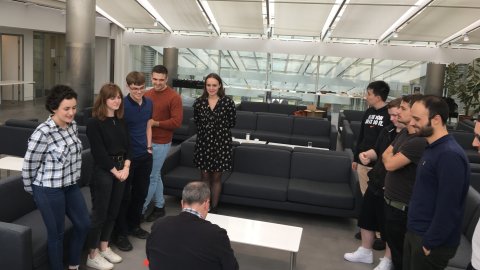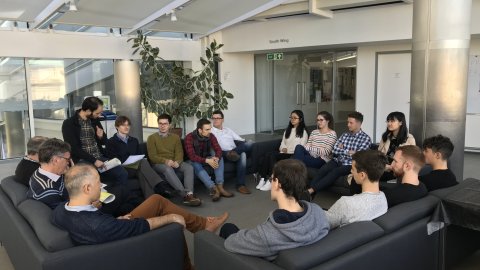Oxford Mathematician Georgia Brennan has won a silver medal in the Mathematical Sciences category at STEM for Britain 2021 for her poster (extract in the image) on 'Mathematically Modelling Clearance in Alzheimer’s Disease: A Mathematical Drug Trial for the UK’s Protein Pandemic'.
11:30
On pseudo-analytic and adelic models of Shimura curves (joint with Chris Daw)
Abstract
I will discuss the multi-sorted structure of analytic covers H -> Y(N), where H is the upper half-plane and Y(N) are the N-level modular curves, all N, in a certain language, weaker than the language applied by Adam Harris and Chris Daw. We define a certain locally modular reduct of the structure which is called "pure" structure - an extension of the structure of special subvarieties.
The problem of non-elementary categorical axiomatisation for this structure is closely related to the theory of "canonical models for Shimura curves", in particular, the description of Gal_Q action on the CM-points of the Y(N). This problem for the case of curves is basically solved (J.Milne) and allows the beautiful interpretation in our setting: the abstract automorphisms of the pure structure on CM-points are exactly the automorphisms induced by Gal_Q. Using this fact and earlier theorem of Daw and Harris we prove categoricity of a natural axiomatisation of the pseudo-analytic structure.
If time permits I will also discuss a problem which naturally extends the above: a categoricity statement for the structure of unramified analytic covers H -> X, where X runs over all smooth curves over a given number field.
Primal-dual Newton methods, with application to viscous fluid dynamics
Abstract
I will discuss modified Newton methods for solving nonlinear systems of PDEs. These methods introduce additional variables before deriving the Newton linearization. These variables can then often be eliminated analytically before solving the Newton system, such that existing solvers can be adapted easily and the computational cost does not increase compared to a standard Newton method. The resulting algorithms yield favorable convergence properties. After illustrating the ideas on a simple example, I will show its application for the solution of incompressible Stokes flow problems with viscoplastic constitutive relation, where the additionally introduced variable is the stress tensor. These models are commonly used in earth science models. This is joint work with Johann Rudi (Argonne) and Melody Shih (NYU).
--
A link for this talk will be sent to our mailing list a day or two in advance. If you are not on the list and wish to be sent a link, please contact @email.
14:00
Regularity, stability and passivity distances for dissipative Hamiltonian systems
Abstract
Dissipative Hamiltonian systems are an important class of dynamical systems that arise in all areas of science and engineering. They are a special case of port-Hamiltonian control systems. When the system is linearized arround a stationary solution one gets a linear dissipative Hamiltonian typically differential-algebraic system. Despite the fact that the system looks unstructured at first sight, it has remarkable properties. Stability and passivity are automatic, spectral structures for purely imaginary eigenvalues, eigenvalues at infinity, and even singular blocks in the Kronecker canonical form are very restricted and furthermore the structure leads to fast and efficient iterative solution methods for asociated linear systems. When port-Hamiltonian systems are subject to (structured) perturbations, then it is important to determine the minimal allowed perturbations so that these properties are not preserved. The computation of these structured distances to instability, non-passivity, or non-regularity, is typically a very hard non-convex optimization problem. However, in the context of dissipative Hamiltonian systems, the computation becomes much easier and can even be implemented efficiently for large scale problems in combination with model reduction techniques. We will discuss these distances and the computational methods and illustrate the results via an industrial problem.
--
A link for this talk will be sent to our mailing list a day or two in advance. If you are not on the list and wish to be sent a link, please contact @email.
16:00
Boundaries, Factorisation & Mirror Duality
Abstract
I will review recent work on N=(2,2) boundary conditions of 3d
N=4 theories which mimic isolated massive vacua at infinity. Subsets of
local operators supported on these boundary conditions form lowest
weight Verma modules over the quantised bulk Higgs and Coulomb branch
chiral rings. The equivariant supersymmetric Casimir energy is shown to
encode the boundary ’t Hooft anomaly, and plays the role of lowest
weights in these modules. I will focus on a key observable associated to
these boundary conditions; the hemisphere partition function, and apply
them to the holomorphic factorisation of closed 3-manifold partition
functions and indices. This yields new “IR formulae” for partition
functions on closed 3-manifolds in terms of Verma characters. I will
also discuss ongoing work on connections to enumerative geometry, and
the construction of elliptic stable envelopes of Aganagic and Okounkov,
in particular their physical manifestation via mirror duality
interfaces.
This talk is based on 2010.09741 and ongoing work with Mathew Bullimore
and Samuel Crew.
12:00





